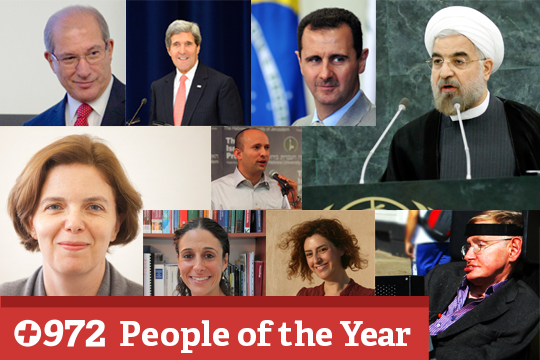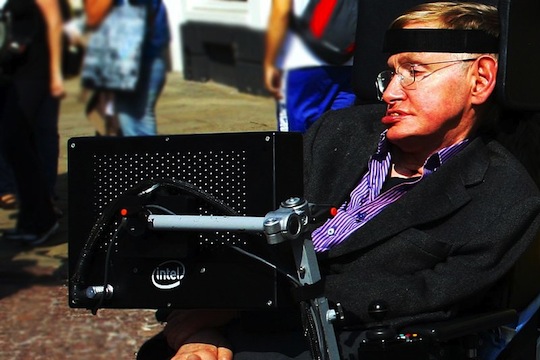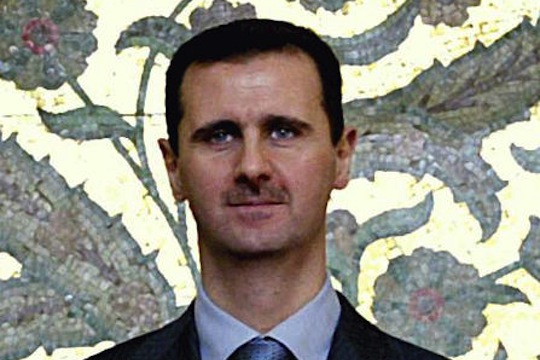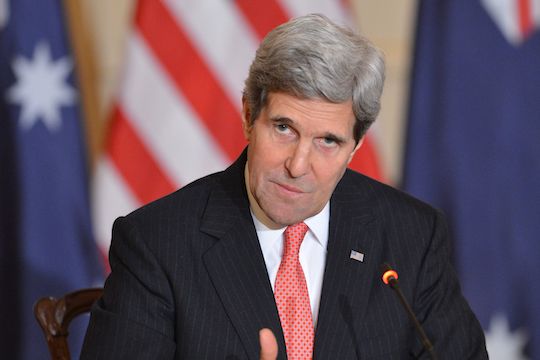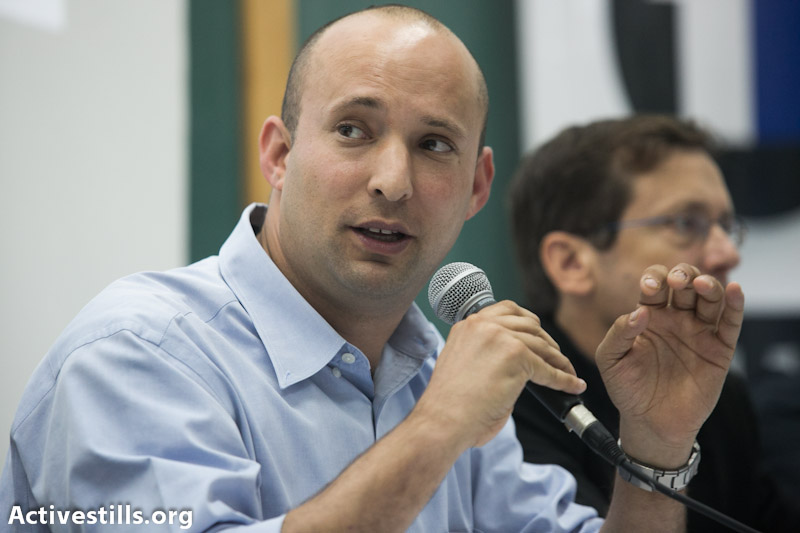Featured prominently in headlines this year were diplomatic initiatives that averted wars and lowered nuclear tensions, boycott victories, Israeli labor organizing, settlers settling in to mainstream politics, human rights defenders and at least one ruthless dictator. +972 bloggers pick the people who, for them, defined Israel, Palestine and the wider region in 2013.
Read why +972 bloggers voted Edward Snowden as 2013’s person of the year.
Hassan Rouhani, president of Iran
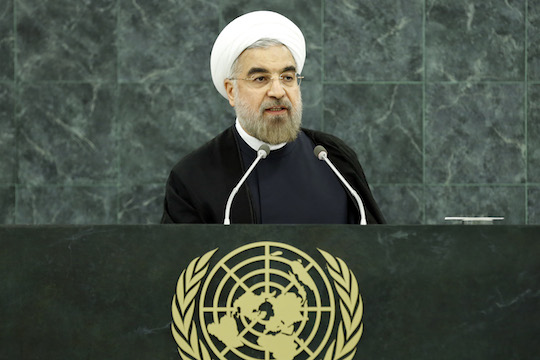
Hassan Rouhani and the dynamic he generated in the few short months since becoming Iran’s president are a perfect example of how established regional patterns can change when you alter just one variable.
A war with Iran has never seemed more remote and a slow but unmistakable thaw between Washington and Tehran is taking place after over three decades of winter. Rouhani played no small part in averting a manifestly ill-concieved and ill-timed U.S. assault on Syria by indicating to President Bashar al-Assad that Tehran has its own red lines as well; and his relentless demonstrations of good will are pushing Netanyahu further and further into isolation, not to say irrelevance – a dynamic that will have its effect on Israel’s susceptibility to pressure on the Palestinian front (if any player of importance cared to apply it in earnest) and on Netanyahu’s own career (although a shift to the Left or even the “center” is highly unlikely).
Rouhani’s election does little to credit the Iranian regime system, which is still one of the most sophisticatedly repugnant and repressive forms of government ever created. But it says a great deal about the power of the very idea of political participation and public pressure: even when only allowed to escape through as narrow a safety valve as the Iranian presidential elections, it can still set in motion processes of great national and regional change.
— Dimi Reider
Stephen Hawking, physicist and academic
It wasn’t Roger Waters, Alice walker, Elvis Costello or even the American Studies Association that gave the boycott movement its most serious boost this year; it was renowned British physicist Stephen Hawking. Hawking, 71, announced in May he would not be attending Israel’s annual Presidential Conference because of an “independent decision to respect the boycott, based upon his knowledge of Palestine, and on the unanimous advice of his own academic contacts there.” Hawking’s decision made headlines in Israeli and international media. Israeli politicians, journalists and organizers of the conference reacted with outrage and condemnation.
As Larry Derfner pointed out at the time, many liberal Israelis who oppose the occupation but oppose the boycott say they don’t support BDS because it is ineffective. They are being proven wrong, and in 2013, Hawking best exemplified that trend. If the boycott is so ineffective, why is a Hawking’s individual decision not to attend a conference in Israel such a huge deal? Since then we have also seen how the academic boycott has grown, with two American academic associations getting behind it.
Stephen Hawking is my nomination for person of the year because he showed — in the simplest and most humble way, without fuss or fanfare — the power of an individual to take a stand against the status quo of Israeli occupation by employing tools of non-violent protest.
— Mairav Zonszein
Bashar al-Assad, president of Syria
In 2013, Middle East watchers stopped talking about when Syria would get rid of Bashar al-Assad. Now they mostly talk about “if.” If the western powers can accommodate him. Or convince him to compromise. Or convince the opposition to give up and accept his leadership.
In 2013, Bashar al-Assad showed that one man can gas his own people with impunity. That he can create the biggest and gravest refugee crisis in the world, forcing hundreds of thousands of people over the borders into Turkey, Jordan, Lebanon and Iraq and threatening the whole region with destabilization. Today there are at least 2.5 million Syrian refugees. The number of Syrians killed over the past three years of civil war is higher than the number of people who were killed in the entire 14 years of Lebanon’s civil war. And there does not seem to be any end-game — not among Assad or the Syrian opposition, and certainly not among the big powers. Iran, Russia and Hezbollah have tied the United States and the Western European powers in knots: they don’t want to commit troops to an intractable, complex and bloody civil war; but nor do they want the Islamic fundamentalists, who seem to be dominating the Syrian opposition in several areas, to take over the country. And so they dither. Meanwhile, jihadis from all over the world have infiltrated Syria via its porous borders, making it the newest playground for the latest manifestation of al Qaeda, which is scaring the hell out of the western powers.
Three years into a brutal civil war that has taken the lives of hundreds of thousands of civilians, laid waste to Aleppo, Homs and many other smaller cities, and created a refugee crisis that could have major regional political ramifications, Bashar al-Assad sits in Damascus, apparently impervious and immovable. For his ability to affect the region’s policy and politics, albeit in the most negative possible way, I nominated Bashar al-Assad Person of the Year.
— Lisa Goldman
Female human rights defenders: Sari Bashi, Dalia Dromi and Jessica Montell
The Israeli human rights world, or at least a number of its leading NGOs, is currently going through quite a shake-up as three executive directors announced their plans to step down this year. These three women head some of the most high-profile organizations that positively affect and improve the lives of those under occupation as well as the way this conflict is covered in the media.
Jessica Montell, B’Tselem
Montell joined B’tselem in 1995 and became its executive director in 2001. Under Montell, who in 2011 was selected by Haaretz as one of “the year’s 10 most influential Anglo immigrants,” B’Tselem became the go-to source for information on human rights in the occupied territories. Its staff of researchers constantly churns out reports on torture, land expropriations, discrimination, settler violence, children’s rights and more. More recently, its video project – where local Palestinians are given cameras to document activities of settlers and the IDF – has literally changed the way the conflict is documented by bringing the occupation up close for viewing on anyone’s home computer or mobile device.
Montell, who also has a wide following on Twitter, said in a recent interview to +972 Magazine: “I am proud of our accomplishments on two different levels. One in terms of policy changes: rerouting the separation barrier, stopping the policy of using Palestinians as human shields, changing the military’s accountability policies and ensuring that there are criminal investigations into the deaths of Palestinians. Those are concrete policies that have been changed for the better. But I would also say, more broadly, keeping issues of human rights and occupation on the public agenda and even expanding the reach of that message, both to the Israeli public and to important audiences internationally.”
Sari Bashi, Gisha
Bashi founded Gisha in 2005 as an NGO aiming to protect Palestinians’ freedom of movement, especially Gaza’s 1.7 million residents. Gisha promotes rights guaranteed by international and Israeli law, and through its legal work it represents individuals and organizations in Israeli courtrooms. Over the past few years Gisha has shown how the siege on Gaza has continued despite claims to the contrary, and continuously publishes reports on how the Gaza closure affects the population under siege. Bashi, an ultra-marathon runner who takes part in 200km races, has successfully managed together with her team at Gisha to keep the closure on Gaza on the agenda of activists, journalists and policy makers, despite it being almost entirely neglected by local and international media.
Dalia Dromi, Bimkom
Bimkon is an NGO comprising of professional planners and architects who work on strengthening democracy and human rights in the field of spatial planning and housing policies in Israel and in Area C of the West Bank. Dromi, who has a PhD in comparative literature from UCLA and headed the public outreach department at the Association for Civil Rights in Israel, has been the director of Bimkom since January 2006. Under her leadership Bimkom has become the expert on Israeli planning policies and how they affect minorities, such as the Bedouin in the Negev (and together with the Regional Council for Unrecognized Villages, produced an alternative masterplan to the Prawer Plan). Bimkom has made great efforts in changing government policies by publishing reports, helping communities on the ground and advocating for policy change that is mindful of the affected community.
— Ami Kaufman
John Kerry, U.S. secretary of state
The consensus wisdom in 2013 has been that America is retreating from the Middle East, or at least retreating from Middle East wars: it was burned in Iraq and Afghanistan, which is why Obama didn’t make good on his threat to bomb Syria if it used chemical weapons; why he has compromised with Iran in the nuclear talks; and why, it is believed, he has taken the military option against Iran “off the table.”
The point man in Washington’s shift has been Secretary of State John Kerry. He oversaw the deal to destroy Syria’s chemical weapons (a deal he inadvertently made possible with an off-the-cuff statement at a press conference). Kerry is also overseeing the nuclear talks with Iran. On both these fronts, he deserves credit: he’s steered the U.S. away from war (albeit with Syria, war is what he was originally steering toward).
In Kerry’s third major Middle East effort of the year, though – the Israeli-Palestinian peace talks – he’s doing a lousy job, caving into Netanyahu time after time, letting the Israeli prime minister negotiate without recognizing any Palestinian rights, letting him build settlements like crazy, and now reportedly backing Netanyahu’s insistence on keeping Israeli troops in the Jordan Valley for at least 10 years after a peace treaty is signed, which the Palestinians rightly object to as an extension of the occupation. The London-based Al-Hayat quoted Palestinian officials saying Kerry also supports Netanyahu’s insistence that Abbas recognize Israel as a Jewish state, which would be spitting in the face of 1.6 million Arab citizens of Israel.
So while Kerry has been an (uncertain) American pathfinder with Syria and Iran, on the local front he is nothing new at all – just the latest in a long line of American “lawyers” for Israel.
— Larry Derfner
Ahmet Uzumcu, director-general of the Organization for the Prohibition of Chemical Weapons
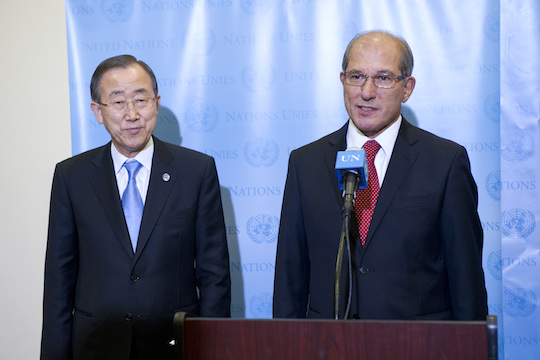
One should not be naive about multilateralism or disarmament. As many have pointed out, chemical weapons, specifically, are hardly weapons of “mass” destruction and are often no more harmful than “conventional” weapons.
Nonetheless, I applaud any move to reduce the huge stockpile of armaments encumbering our world, and every instance in which multilateral institutions avert unnecessary and potentially catastrophic wars. So Organization for the Prohibition of Chemical Weapons director-general Ahmet Uzumcu’s Nobel prize was well deserved, just as the one given to the International Atomic Energy Agency a few years back.
— Roi Maor
Naftali Bennett, minister and chairman of the Jewish Home party
If 2012 was crowned the “year of the settler,” then 2013 was the year that settler moved from the hills of the West Bank into the heart of the Israeli mainstream, in the form of Naftali Bennett. And that’s just the thing – Naftali Bennett doesn’t even need to live in Hebron or Yitzhar (he lives in the wealthy Tel Aviv suburb of Ra’anana) to be the settler movement’s new mouthpiece.
While Netanyahu and Lapid were the big winners in this year’s elections, it was veteran hi-tech superstar Bennett who was able to resuscitate a long-dead political party to become the Right’s moderate, more palatable face, pulling in votes from both religious and secular Jews. Bennett’s down-to-earth persona coupled with impressive social media dexterity allowed him to connect to average Israelis, something the ideological right has never quite figured out how to do properly.
2013 was the year in which Ashkenazi men reminded all of us who really runs this place. If Netanyahu and Lapid represent how Israeli Jews like to view themselves (part of a white, secular, and refined middle class), Bennett became the most accurate reflection of what Israeli society truly looks like – an increasingly fundamentalist, capitalistic and annexationist society.
— Edo Konrad
Israel’s female labor leaders
The past year has been an amazing year for organized labor in Israel. Roughly 20,000 workers joined unions in 2013. The growth has been attributed to growing social cleavages, the rising cost of living and lingering after-effects of 2011’s J14 social justice protests. In 2013 we saw coordinated attacks on workers by private capital, financial papers and the privatization-oriented government. There have also been strikes and victories: the first ever collective bargaining agreements in the fields of fast food (Burger Ranch) and cellular phone providers (Pelephone). This revival brings with it the possibility of considerable change in Israeli finance, society and hopefully in the long run – maybe even politics.
The field of organized labor, however, remains to a great extent dominated by men. The Histadrut labor federation, which represents some 700,000 Israeli workers in various unions, has never been led by a woman. The leading council of the Histadrut is made out of 45 men and five women, only one of whom is head of a department or a union, and that too just happens to be the women’s union Na’amat. Things are looking better in the alternative, democratic and much smaller “Power to the Workers” union, which has a fairly gender balanced leadership; but there too, most heads of staff and committees are men.
However, a new female leadership began forming in the latest wave of organizing in 2013. In media, finance, telecommunications, theater, the parliamentary assistants’ union and others, more and more women are taking leading positions and forming alliances with each other to promote a new face of organized labor. For this reason, and out of immense admiration of my own partner in the Ma’ariv workers’ union, Gaby Goldman, I nominate female labor leaders as people of the year.
— Haggai Matar
Related:
+972’s Person of the Year 2013: Edward Snowden
+972’s Editor’s Picks of 2013
Ten most-read posts of 2013
+972 People of the Year 2012: Bloggers’ picks
+972’s Person of the Year 2012: The Settler

